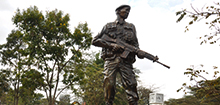
Date Published:
Cabinet Secretary for Tourism, Wildlife and Heritage Hon. Peninah Malonza has been elected the president of the 13th Governing Council of Parties to the Lusaka Agreement. Hon Malonzo was bestowed upon the presidency of the regional conservation body by follow Cabinet minister from six member countries comprising of Kenya, Congo Brazzaville, Lesotho, Liberia, Tanzania and Zambia, and has Ethiopia, Eswatini and South Africa as signatories.
The Lusaka Agreement has a three-tier organizational mechanism comprising a Ministerial decision-making organ called the Governing Council, a national implementing and enforcement authority known as National Bureau and a permanent regional body serving as operational arm and Secretariat of the Agreement called the Lusaka Agreement Task Force (LATF).
The ministers alongside delegates from their respective countries congregated at a Nairobi hotel for a two-day conference that culminated in the election of Hon. Malonza, who now takes over from Rodney Sikumba , the Zambian minister responsible for Tourism and Natural Resources.
Speaking after being elected, Hon Malonza promised to lead member countries to play a pivotal role in global biodiversity conservation, with specific focus on combating wildlife and forest crimes, and addressing the threat of climate change. She pledged to strengthen the implementation of activities under Lusaka Agreement mandate, ensuring that it remains steadfast in achieving Sustainable Development Goals (SDGs).”
“Kenya, supported by the United Republic of Tanzania and the Republic of Congo, will explore various avenues to provide adequate resources for the Lusaka Agreement Task Force and ensure the fulfillment of its mandate to combat illegal trade in wild fauna and flora”, said the Cabinet Secretary.
Hon. Malonza exhorted all member countries to lend their unwavering support to the Lusaka Agreement treaty to enable LATF effectively counter organized wildlife crime. LATF, through the Lusaka Final Act holds a unique mandate to enhance cross-border cooperation in the fight against wildlife crime.
She called for harnessing the power of technology, amplifying data compilation efforts, and building upon existing trans-boundary information systems to address the multifaceted challenges posed by poaching, illegal wildlife trade and human-wildlife conflicts. The CS cited other challenges that need concerted efforts to eradicate as agro-pastoral conflicts, illegal logging, illegal timber trade, and illegal fishing.
Hon Malonza appealed to member states of the Lusaka Agreement to fulfil their financial obligations for the sustainability of LATF, noting that some parties are yet to fully meet their commitments to the regional body.
Earlier while address delegates attending the conference, Kenya’s Principal Secretary for the State Department of Wildlife Hon. Silvia Museiya said the Kenya government is putting in place measures, both mitigation and adaptation to ensure wildlife protection. She said organized wildlife crime endangers the conservation of wildlife, besides threatening the socio-economic, and environmental sustainability of member states of the Lusaka Agreement.
Kenya Wildlife Service (KWS) Acting Director General Dr. Erustus Kanga said KWS is greatly honoured to host Lusaka Agreement Taskforce Secretariat, which is domiciled at its headquarters complex within Nairobi National Park. Dr. Kanga stated that KWS and LATF staff have integrated very well since 1996 when the secretariat was constituted.





